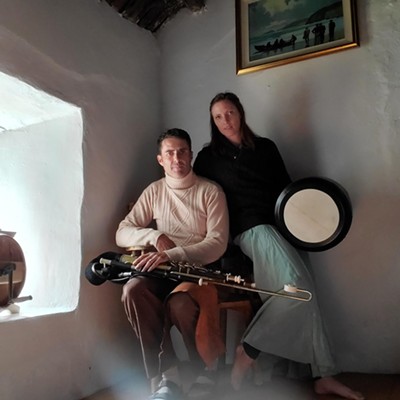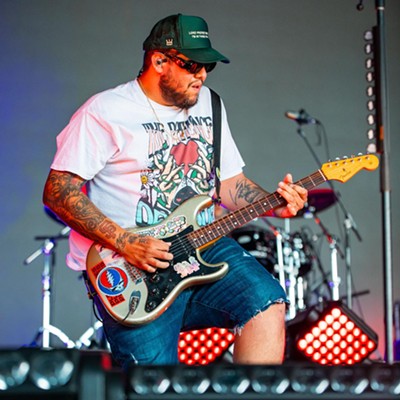As a founding member of Canadian alt-jangle-pop group the Barenaked Ladies, Steven Page seemed, from the outside at least, to have it all. World tours in front of thousands, hit after hit—it looked like he was living the dream life. He was a primary songwriter, responsible for beloved tunes such as "Brian Wilson." But then, in 2009, he quit. His debut solo album, cheekily titled The Vanity Project, was released four years prior, but the end of the last decade coincided with his decision to go it alone.
"I've been able to make the records I want to make, the way I want to make them, with the people I want to make them with," Page says. "I've also been able to do a lot of touring with a group called the Art of Time Ensemble. A hybrid of classical and jazz musicians. I've been figuring out how to do it all over again; when we started the band in 1988 the music industry was very different. The way you'd book tours was very different. The way you'd get attention was very different. It was word of mouth, which was much like social media. But it was very different. Especially because I'm also in my late 40s now. So it's been a learning curve, and I've been away from the full on touring for a long time. I usually do a few dates here, a few dates there, see who wants me to come."
Page's new album Discipline: Heal Thyself, Pt. II, came out in September, and the work has encouraged him to tour more vigorously. He's been to the UK twice in the last year, and the Eastern part of the U.S. The audiences, he says, have been warm and receptive to the new material as well as the old stuff. Which is wonderful, because the new album is an accomplished slab of work. Typically quirky but meaningful—the songwriting is, as ever, exemplary.
As the title suggests, the new album is the second part of a project that began with Heal Thyself, Pt. I: Instinct in 2016. There is a story, a concept, which Page says shifted between records.
"In a certain way on the first record, a lot of the songs were me chastising myself for my own navel gazing," he says. "Looking to get out but trying to solve the issues. The idea of fixing things things is such a crazy thing when you, let's say, suffer from depression or you go through a tough time in your life and need to make some changes. People will tell you to pull yourself up by your bootstraps. It's not that easy. The conclusion of the first record was, you've got to do it with other people. That's what I've realized being a solo artist. It's not necessarily doing it alone. It just means that I can choose from a huge variety of collaborators."
The second album sees Page looking outwardly a little more. Whereas with Instinct, Page was asking questions about what it means to be an artist, Discipline has more to do with how to use that artistic voice.
"We say the word artist, and it all of a sudden sounds pretentious," he says. "We somehow have to portray ourselves as workers in order to have any self respect or respect from the outside world. As much as I identify as a worker, part of me always says, 'Is this really work?' With the new record, it's like, if I'm OK with being an artist and I've found my voice, what do I do with it? Do I try to make music so that people can interpret it however they like, or do I show people who I am, whether it's political and stuff as I've always done. Or is it more details about the way I feel about the world. That can be a daunting thing."
Even the titles of the albums are interesting; the word "instinct" suggests that Page was shooting from the hip on that previous record, while "discipline" seems to have more to do with something more calculated.
"You need both in order to make good art," Page says. "There's something to be said for naive art, but I don't want to listen to The Shaggs all the time. I think there are tons of classical musicians and composers who get to a certain level and then they crave the naivety that they had as a younger person so they can unlearn the rules. But if you've got music inside of your head, but you don't have the tools to help it come out, it's never going to be satisfying for you or for the audience."
Much of the inspiration for the songwriting on Discipline comes from the clusterfuck that is the current social and political situation the world over, but particularly in the United States. "White Noise," for example, is about the white nationalist-related incidents in Charlottesville last year.
"I don't normally sit down and write songs as responses to world events," Page says. "Usually, even if I was going to, I would hide it in a metaphor or I would pull some punches. I would at least try to add some nuance to it. But I felt so kind of shocked, even though I'm deeply cynical and very much in touch with the way the world's working. I was not surprised by the election of Donald Trump. I was not surprised by the normalization of xenophobia, racism and anti-semitism. But it still feels like a gut punch whenever you see it."
Page says that he hasn't performed in Tucson in more than a decade, but he has great memories of his last visit, describing the food as "some of the best in the country." He's looking forward to returning this week, and promises a career-spanning set.
"I see a lot of artists of my generation or older, they go out to play a show and play one or two of the obligatory new ones, and always make some self-deprecating comment," Page says. "In this case, people do want to hear it. People make requests for new songs, and seem to feel like it's like catching up with an old friend."








